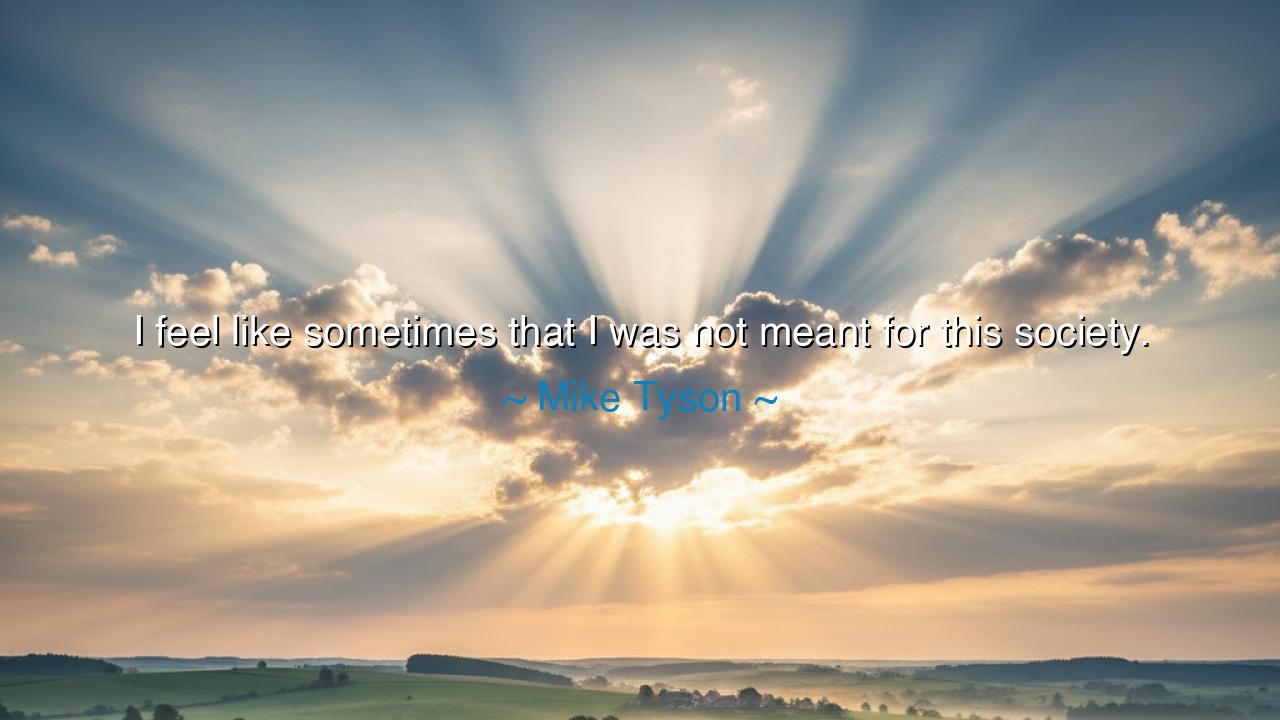
I feel like sometimes that I was not meant for this society.






"I feel like sometimes that I was not meant for this society." These poignant words from Mike Tyson carry the weight of deep existential reflection. Tyson, the former boxing champion, often viewed himself as an outsider, struggling to reconcile his inner nature with the expectations of the world around him. This feeling of alienation, of being at odds with the fabric of society, is not unique to Tyson but resonates with many who feel out of place, misunderstood, or abandoned by the systems that are meant to nurture them. His words reflect the loneliness of being a misfit in a world that demands conformity, and the silent battle between personal identity and societal expectation.
In the ancient world, this theme of alienation was explored by philosophers like Socrates and Diogenes. Socrates, often considered the wisest of the ancient philosophers, famously challenged the Athenian establishment, questioning the values and beliefs that defined his society. He was not one to conform to the norms of his time, and his alienation from the Athenian way of life led to his eventual trial and execution. In many ways, Socrates' life reflects the torment of individuals who are called to question the established order and yet, in doing so, find themselves isolated and ostracized from the world they inhabit. Socrates, like Tyson, felt as though he were not meant for the society in which he lived, but instead was destined to challenge it—often at great personal cost.
Consider, too, the story of Diogenes, the ancient Greek philosopher known for his rejection of conventional society. Diogenes lived in a barrel and embraced a life of extreme simplicity, challenging the values of wealth, fame, and luxury that many held dear. He was, in every sense, a man out of step with his times, preferring to live outside the structured, civilized society that others fought so hard to build. For Diogenes, his alienation was not a sign of weakness, but a powerful statement against a world that valued material possessions over truth and virtue. He understood the disconnect between individual freedom and the demands of society, and like Tyson, he felt a tension between who he was and what the world expected him to be.
Tyson’s struggles echo the experiences of countless individuals throughout history who have felt the weight of societal expectations press upon them. In his case, the boxing ring was both a place of triumph and a prison. Tyson’s natural abilities made him a champion, but his emotional turmoil and struggles with identity often placed him at odds with the very world that celebrated him. Much like the warrior-poets of old, Tyson was not simply a fighter; he was a man battling both external opponents and internal demons. His alienation from society stemmed from his inability to fit neatly into the role of celebrity, athlete, and man of virtue that others expected him to fulfill. Instead, Tyson’s life became a reflection of the tensions that arise when one’s authentic self is at odds with the expectations placed upon them.
This feeling of misalignment with the world, of being out of place in the very society that one inhabits, is a powerful and often painful experience. The lesson to be learned from Tyson’s words—and from the examples of Socrates and Diogenes—is that alienation does not always signify failure. In fact, it can be a sign of strength and individuality. The path of the outsider, while difficult, is also the path of those who have the courage to question the norms, to refuse to be molded into a shape that does not fit. Alienation can be a space where new ideas are born, where authenticity flourishes, and where the spirit is not constrained by the limitations imposed by society.
Yet, while Tyson’s alienation speaks to the individual’s struggle, it also calls upon society to reflect on its own shortcomings. Why do we create systems that demand conformity? Why is there so little space for those who, like Tyson, feel out of sync with the world around them? The lesson is clear: we must work toward a society where diversity of thought, of identity, and of being is not only tolerated but celebrated. A world that allows individuals to express their true selves without the pressure of conformity is one that nurtures not just growth, but compassion and understanding.
In our own lives, let us heed the message of Tyson’s experience. The world may not always understand us, and society may not always know how to accept the individuals who walk a different path. But instead of retreating into alienation, we must find ways to embrace our uniqueness, to use our struggles not as a reason to break down, but as a foundation from which to build a life of purpose. Let us not shrink from the discomfort of being out of step with the world; rather, let us use it as an opportunity to shape our own destiny and, in doing so, offer the world a vision of what it means to live authentically and with honor, regardless of the society that surrounds us.






AAdministratorAdministrator
Welcome, honored guests. Please leave a comment, we will respond soon